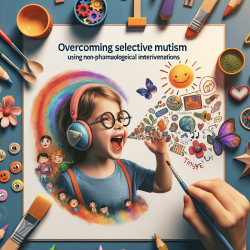Understanding the Impact of Transgender Sports Bans on Mental Health
The recent study titled "Serial Mediation Analysis of the Association of Familiarity with Transgender Sports Bans and Suicidality among Sexual and Gender Minority Adults in the United States" offers critical insights into the mental health challenges faced by the Sexual and Gender Minority (SGM) community. This research highlights the significant association between familiarity with transgender sports bans and increased suicidality among SGM adults. As practitioners in speech-language pathology and related fields, understanding these findings can help us advocate for better mental health outcomes for affected populations.
Key Findings from the Study
The study utilized a cross-sectional design with data from 1,033 SGM adults across the United States. The results demonstrated that familiarity with state-level transgender sports bans is significantly associated with higher levels of suicidality. This association persists even after accounting for interpersonal and individual stigma.
- Interpersonal Stigma: This includes discrimination and prejudice experienced from others, such as family rejection or victimization.
- Individual Stigma: This involves personal responses to stigma, like identity concealment or internalized homophobia.
The study found that both interpersonal and individual stigma significantly mediate the relationship between familiarity with transgender sports bans and suicidality, indicating that stigma at various levels exacerbates mental health issues within the SGM community.
Implications for Practitioners
As practitioners, it is essential to understand the broader societal and policy contexts that impact the mental health of our clients. The findings from this study suggest several actionable steps:
- Advocacy: Engage in advocacy efforts to oppose discriminatory policies and support inclusive legislation that protects the rights of transgender and SGM individuals.
- Education: Educate clients and their families about the harmful effects of stigma and the importance of supportive environments.
- Support Networks: Encourage the development of support networks for SGM individuals to mitigate the effects of stigma and promote mental well-being.
- Further Research: Encourage further research into the specific mechanisms through which stigma affects mental health and explore interventions that can mitigate these effects.
Conclusion
The study underscores the detrimental impact of transgender sports bans on the mental health of SGM adults. As practitioners, we have a role to play in advocating for policies that promote inclusion and protect the mental health of vulnerable populations. By staying informed and proactive, we can contribute to creating a more equitable and supportive society for all individuals.
To read the original research paper, please follow this link: Serial Mediation Analysis of the Association of Familiarity with Transgender Sports Bans and Suicidality among Sexual and Gender Minority Adults in the United States.










